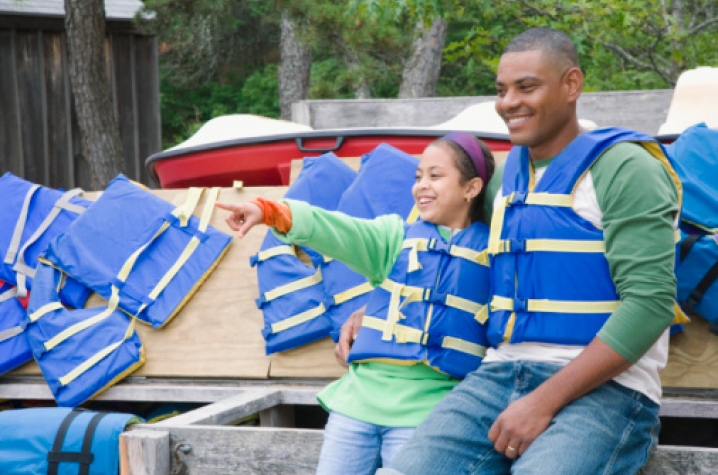The Essentials To Boating Safety: Life Jackets and Supervision

LEXINGTON, Ky. (May 24, 2011) — Whether it’s during vacation or part of an ordinary day, boating can be fun for the entire family, as long as everyone remains safe. In 2009, 18 children under age 13 died in boating-related incidents, half by drowning.
“On a boat, everyone should wear a life jacket at all times,” said Sherri Hannan, a nurse and coordinator of Safe Kids Fayette County, led by Kentucky Children's Hospital. “Look for a life jacket approved by the U.S. Coast Guard. Water wings and other inflatable swimming aids such as inner tubes do not prevent drowning.”
Safe Kids Fayette County recommends that children ages 14 and under wear life jackets not only on boats, but near open bodies of water or when participating in water sports. Kentucky law requires children ages 12 and under to wear life jackets while boating, and children under 13 are required to wear life jackets on any recreational vessel in waters under Coast Guard jurisdiction.
Safe Kids Fayette County also reminds parents and caregivers:
- Always wear life jackets when in or around open bodies of water and on boats. Make sure the life jacket fits snugly. Have the child make a “touchdown” signal — if the life jacket hits the child’s chin or ears, the life jacket may be too big or the straps are too loose.
- Enroll your kids in swimming lessons taught by a certified instructor, but don’t assume swimming lessons or life jackets make your child “drownproof.” These precautions are important, but they’re no substitute for constant and active adult supervision.
- Don’t let kids operate or ride on personal watercraft (such as jet skis).
- Never drink alcoholic beverages while boating — a large portion of boating accidents that occur each year involve alcohol consumption by both boat operators and passengers.
- Nobody should swim near a dock or marina with electrical hookups or lighting — swimmers can be electrocuted in the water.
- Make sure the boat operator has passed a boating safety course approved by the Coast Guard before letting your child and your family ride in the boat. For more information about safe boat operations, visit www.uscgboating.org.
- When there are several adults present and children are swimming, use the Water Watcher card strategy, which designates an adult as the Water Watcher for a designated amount of time (e.g. 15-minute periods) to prevent lapses in supervision. To download a Water Watcher card, visit www.safekids.org.
- Install a carbon monoxide detector on your motorboat to alert you to dangerous levels of exhaust fumes.
- Learn infant and child CPR. In less than two hours, you can learn effective interventions that can give a fighting chance to a child who has fallen into water and become unconscious. Local hospitals, fire departments and recreation departments offer CPR training. Check with your local American Red Cross or American Heart Association centers for layperson CPR training.
National Safe Boating Week is an annual educational campaign, coordinated by the National Safe Boating Council (www.safeboatingcouncil.org), running the week prior to Memorial Day.
For more information sports injury prevention in general, please call Safe Kids Fayette County at (859) 323-1153 or visit www.ukhealthcare.uky.edu/kch/safekids.
About Safe Kids
Safe Kids Fayette County works to prevent accidental childhood injury, the leading killer of children 14 and under. Its members include health and safety experts, educators, community leaders, corporations, foundations, government representatives and volunteers to educate and protect families. Safe Kids Fayette County is a member of Safe Kids Worldwide, a global network of organizations dedicated to preventing accidental injury. Safe Kids Fayette County was founded in 1994 by Kentucky Children's Hospital.




